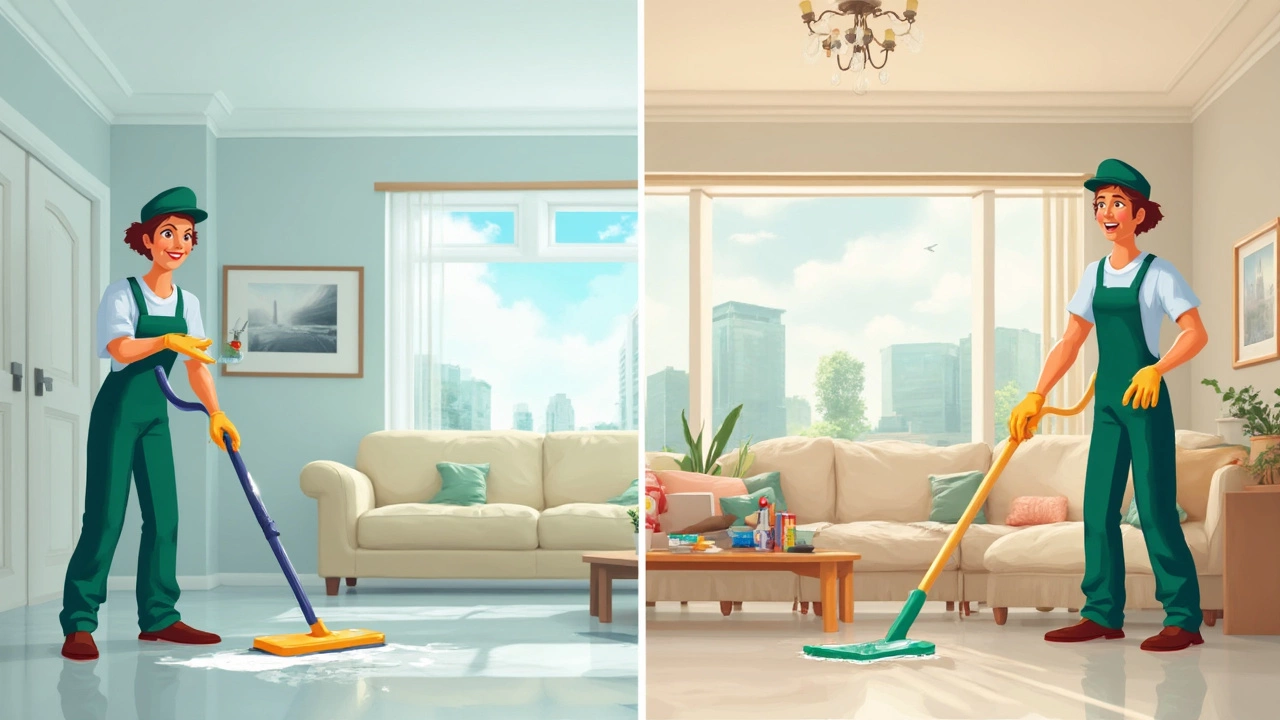Ever noticed how cleaning can mean different things to different people? If you're moving out soon, you're probably going to encounter the odd battle between regular cleaning and its more intense cousin, professional cleaning.
Regular cleaning is what most of us do—like when you vacuum the living room or wipe down the kitchen counters. It's all about keeping things neat day-to-day. Let's be real, though, regular cleaning is usually more about immediate needs rather than a deep, thorough scrub.
But then there's professional cleaning. That's the stuff of legends (or nightmares, depending on who you ask). It goes beyond your usual chores. We're talking steam cleaning carpets, polishing wooden floors, and making bathrooms sparkle as if they've been kissed by angels. In the world of end of tenancy scenarios, especially, professional cleaning can mean the difference between getting your deposit back or being left high and dry.
- Understanding Regular Cleaning
- The Scope of Professional Cleaning
- Why Professional Cleaning Matters for Tenants
- Deciding Between Regular and Professional Cleaning
Understanding Regular Cleaning
Alright, so let's tackle what regular cleaning is all about. This is your everyday tidying up routine—nothing too fancy but enough to keep your space liveable. We’re talking about stuff like wiping down surfaces, dusting off shelves, and vacuuming the areas you use the most. Think of it as the daily or weekly maintenance your home needs to prevent it from turning into a disaster zone.
Regular cleaning often follows a basic checklist that many of us know by heart:
- Dusting shelves, tables, and other furniture.
- Vacuuming carpets and mopping hard floors.
- Cleaning kitchen counter-tops and ensuring no food debris lingers.
- Scrubbing bathroom sinks and toilets to keep things fresh.
One cool fact? Regular cleaning, when done consistently, can significantly improve indoor air quality. Dust and allergens love to settle on surfaces and in carpets. Regular vacuuming and dusting can help tackle these nuisances, which keeps those sneezes at bay and maintains a healthier environment overall.
Moreover, setting a regular cleaning schedule can actually save you time in the long run. Instead of waiting until your home needs an all-out clean-a-thon, sticking to smaller, regular tasks can help manage the workload.
A quick tip: Keep a stash of your favorite cleaning supplies handy. Having what you need at arm's reach can make the regular cleaning process less of a chore and more of an efficient routine.
The Scope of Professional Cleaning
Alright, so what makes professional cleaning stand out in a big way? Think of it as the superhero of cleaning. It's not just about tidying up; it's about transforming a space into something that might even look brand new.
When you're bringing in the pros, you're getting a complete, top-to-bottom service. This often includes deep-cleaning carpets with specialized equipment like steam cleaners that can pull out dirt and grime regular vacuuming won't touch. Got stubborn stains? They've got the know-how to tackle those as well.
Bathrooms and kitchens—which are frequent trouble spots in leases—get special attention. Expect grout lines to be scrubbed, shower heads to be descaled, and ovens to be cleaned like they're straight from the store. It's not just about giving it a wipe; it's about leaving it spotless.
- Carpet Cleaning: Deep steam cleaning targets dust mites, allergens, and tough stains.
- Kitchen Deep Clean: Tackles appliances, backsplash, and tiles; making sure grease and crumbs are history.
- Bathroom Overhaul: From tile grout to shower screens, no detail is left untouched.
- Polishing Floors: Wood or tile, they get buffed and polished to restore shine and remove scuffs.
The real magic happens in the attention to detail. You know those areas you always forget, like the tops of cupboards or skirting boards? They remember. That's what sets professional cleaning apart from your Saturday morning scrub-down.
Hiring professionals is especially crucial when ending a tenancy. Landlords and agents typically expect a space to be in the best condition possible, and a lack of thorough cleaning is a common reason for deposit deductions. Plus, they often have a checklist that professional cleaners are familiar with, ensuring nothing is missed.
Wondering if it's worth it? According to a survey, tenants who opted for end of tenancy cleaning claimed back more of their deposit compared to those who didn't go professional. That alone could tip the scales if you're weighing costs.

Why Professional Cleaning Matters for Tenants
So, your lease is almost up, and you're knee-deep in boxes and bubble wrap. The last thing you want is trouble with your landlord about the state of the place you're leaving. Here's why professional cleaning could be your best friend at this point.
First things first, landlords are picky. When they say 'clean', they mean spotless. Think of the oven, the grime in window tracks, or the dust bunnies behind appliances. Missing these spots could cost you a chunk of your deposit. A professional team won't overlook these nooks and crannies because they're trained for thoroughness. They know all the secret hideouts of dirt and grime that tenants often miss.
Another reason to consider professional cleaning is the time factor. Moving is chaotic, right? Juggling packing, paperwork, and cleaning can be overwhelming. Hiring pros allows you to focus on the mountains of other stuff you need to do, without sacrificing quality. It's like delegating while ensuring high standards.
Let’s not forget about the equipment and products. Professional cleaners have access to industrial-grade supplies that are way more effective than what most of us keep under our sinks. These heavy-duty tools not only make things cleaner but also help maintain the property’s condition, which landlords really appreciate.
Here’s an interesting fact: Some property managers require a receipt from a professional cleaning service as proof of condition at move-out. It's like having a safety net for your deposit!
And remember, peace of mind is priceless. By hiring professionals, you can rest easy knowing that everything's in expert hands. You get to walk away stress-free, without through-the-roof anxiety levels wondering if you've missed a spot.
Deciding Between Regular and Professional Cleaning
So, you're standing at the crossroads wondering what kind of cleaning you actually need. It might not seem like a big deal, but when it comes to the end of a tenancy, this choice can have financial consequences.
Start by assessing the condition of your place. Is the carpet looking a bit rough around the edges? Are there stubborn stains that just won't budge no matter how hard you scrub? If you answered yes, professional cleaning could be your best bet. Professional cleaners have the tools, like industrial vacuums and special cleaners, to tackle these bigger jobs and leave your place looking fresh and new.
If your place just needs a general tidy-up, and there are no major issues like clogged sinks or foul odors, then a regular cleaning might suffice. This means typical vacuuming, dusting, and mopping.
Of course, budget plays a huge part in this decision. Professional cleaning can be pricey, ranging from $150 to $300 for a one-bedroom apartment, depending on the job's complexity. So, weigh that against what you'll gain back in your deposit by keeping your landlord happy.
Here’s a quick checklist to help you decide:
- Check your rental agreement. Sometimes landlords specify that a cleaning service must be used.
- Evaluate potential stains or significant damage that regular cleaning can't handle.
- Consider your time and energy. If you’re juggling a move and other commitments, professionals can save you from burnout.
- Factor in the peace of mind. Professional cleaning might be a splurge, but it ensures your landlord won’t find a reason to hold back part of your deposit due to cleaning issues.
No matter which you choose, the goal is to leave your place as spotless as when you moved in. It's not just about your deposit—it's about leaving a good impression and closing a chapter neatly.
